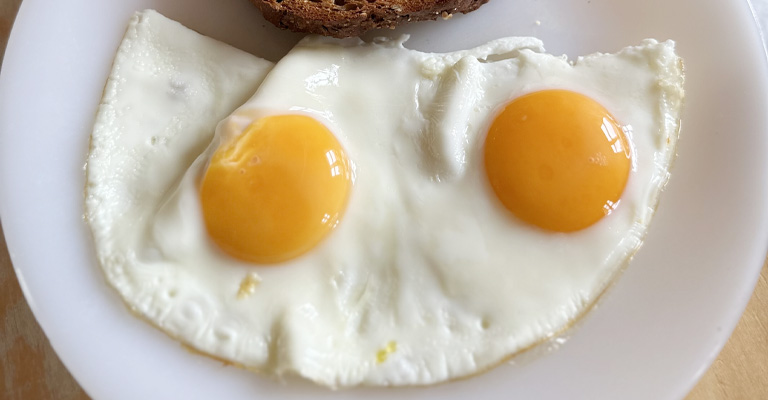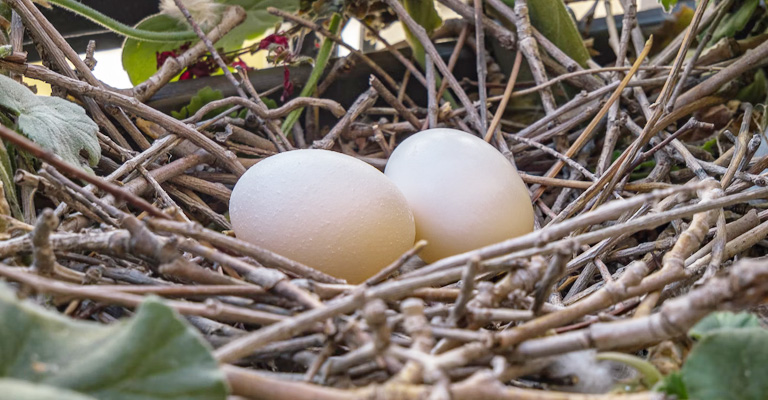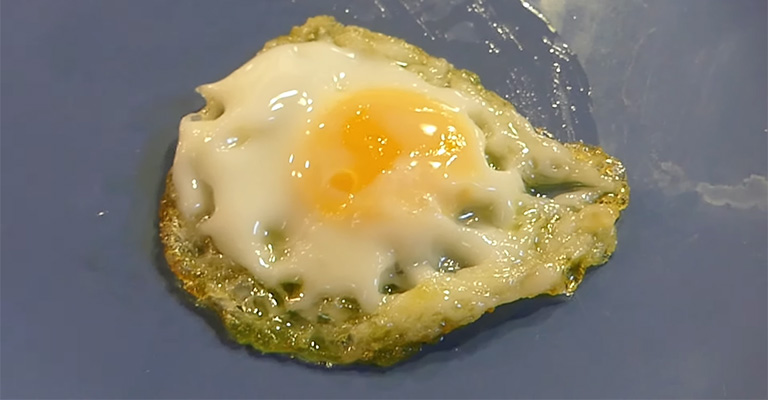The culinary world is full of diverse and intriguing ingredients, and pigeon eggs are no exception. When it comes to eggs, chickens tend to take the spotlight, but pigeon eggs deserve their own moment in the culinary spotlight.
These petite eggs, smaller than their chicken counterparts, are packed with flavour and offer a unique dining experience.
But can you eat pigeon eggs? In this exploration, we venture into the realm of pigeon eggs, examining their taste, culinary versatility, and their status as a delicacy in various cultures.
We unravel the nuances of enjoying pigeon eggs and discover how they can elevate gourmet dishes.
From their delicate size to their rich, creamy flavour, pigeon eggs offer a distinctive culinary adventure that is sure to tantalize the taste buds of those willing to explore beyond the ordinary.

Can You Eat Pigeon Eggs?
Yes, pigeon eggs are edible, and they have been consumed by various cultures throughout history. Pigeon eggs are similar in taste and nutritional value to chicken eggs but are considerably smaller.
They have a rich, creamy texture and a mild, slightly gamey flavour. Pigeon eggs can be cooked in various ways, such as frying, boiling, or baking, and they are often considered a delicacy in some regions.
However, collecting pigeon eggs from the wild is discouraged due to conservation concerns. It’s important to ensure that the eggs you consume are sourced responsibly, either from domesticated pigeons or from reputable suppliers, as the collection of wild pigeon eggs can disrupt local ecosystems and conservation efforts.
Nutritional Values Of Pigeon Eggs

Pigeon eggs, although smaller than chicken eggs, are packed with essential nutrients, making them a valuable source of protein and other beneficial compounds.
Here are some nutritional values of pigeon eggs:
Protein
Pigeon eggs are rich in high-quality protein, which is essential for the growth and repair of body tissues. Protein also plays a vital role in the formation of enzymes, hormones, and antibodies, contributing to overall health and immunity.
Vitamins
Pigeon eggs contain various vitamins, including Vitamin A, B-complex vitamins (such as B6, B12, riboflavin, and folate), and Vitamin D. These vitamins are crucial for vision, metabolism, red blood cell production, and bone health.
Minerals
Pigeon eggs are a good source of minerals like iron, phosphorus, and zinc. Iron is essential for oxygen transport in the blood, phosphorus is vital for bone health, and zinc plays a role in immune function and wound healing.
Fats
Pigeon eggs contain healthy fats, including monounsaturated and polyunsaturated fats. These fats are important for energy, cell structure, and the absorption of fat-soluble vitamins like Vitamin A, D, E, and K.
Choline
Pigeon eggs are a rich source of choline, a nutrient that supports brain health, helps nerve function, and aids in the maintenance of cell membranes.
Antioxidants
Pigeon eggs contain antioxidants, such as selenium, which protect cells from damage and support the immune system.
Lutein and Zeaxanthin
These compounds are important for eye health and are found in pigeon eggs. They help protect the eyes from harmful high-energy light waves like ultraviolet rays.
Including pigeon eggs in your diet in moderation can provide you with these essential nutrients, contributing to your overall health and well-being. As with any food, it’s important to consume them as part of a balanced diet to reap their nutritional benefits fully.
How To Cook Pigeon Eggs?

Cooking pigeon eggs is similar to cooking other types of eggs, but due to their smaller size, they may require shorter cooking times.
Here are some ways to cook pigeon eggs:
Boiled Pigeon Eggs
Place pigeon eggs in a saucepan, cover with water, and bring to a boil. Simmer for about 4-5 minutes for soft-boiled or 10-12 minutes for hard-boiled eggs. Cool them under cold running water, peel, and season to taste.
Fried Pigeon Eggs
Heat a small amount of butter or oil in a skillet. Carefully crack the pigeon egg into the skillet and cook to your preferred level of doneness. Sunny-side up is a popular choice.
Scrambled Pigeon Eggs
Whisk pigeon eggs in a bowl, season with salt and pepper, and cook in a non-stick skillet over low heat. Stir continuously to create soft, fluffy scrambled eggs.
Poached Pigeon Eggs
Bring water to a gentle simmer in a pan with a splash of vinegar. Create a whirlpool in the water and carefully slide the pigeon egg into the vortex. Poach for about 2-3 minutes, then remove with a slotted spoon.
Baked Pigeon Eggs
Preheat an oven to 350°F (175°C). Place pigeon eggs in a buttered ramekin or baking dish, add toppings like cheese or herbs, and bake for about 12-15 minutes until the whites are set.
Pigeon Egg Omelette
Whisk pigeon eggs with a pinch of salt and pepper. Pour the mixture into a heated, greased skillet. Add your choice of fillings (cheese, veggies, etc.), fold, and cook until set.
Deviled Pigeon Eggs
Hard-boil pigeon eggs, then cut them in half. Remove the yolks and mash them with mayonnaise, mustard, and seasonings. Refill the egg whites with this mixture for a delicious appetizer.
These cooking methods provide a range of options to enjoy the unique taste and nutrition of pigeon eggs, whether you prefer them soft-boiled, fried, scrambled, poached, baked, in an omelette, or as deviled eggs.
What Time Does A Pigeon Lay Eggs?

Pigeons, like many birds, typically follow a natural breeding cycle influenced by environmental factors, particularly daylight length and food availability.
Here are some common times when pigeons might lay eggs:
Spring
Spring is a prime breeding season for pigeons. As days lengthen and temperatures rise, pigeons are stimulated to breed. They often start laying eggs in spring, making use of the favourable weather and abundant food supply.
Early Morning
Pigeons are diurnal, meaning they are active during the day. It’s common for them to lay eggs early in the morning when they are most active and alert. This timing aligns with their natural behaviour patterns.
Afternoon
Afternoons are another typical time for pigeons to lay eggs. During the warmer hours of the day, pigeons are engaged in activities like foraging and socializing.
They might choose this time to lay eggs, especially if they have found a secure nesting spot.
Warm Weather Days
Pigeons prefer to breed during periods of stable and warm weather. When the weather is favourable, pigeons are more likely to lay eggs. Mild temperatures and clear skies provide an ideal environment for raising their young.
Availability of Food
Pigeons tend to lay eggs when there is an abundance of food. When they have access to a reliable food source, especially high-quality grains and seeds, they are more likely to enter their breeding cycle and lay eggs.
Safe Nesting Spots
Pigeons look for safe and secure nesting spots to lay their eggs. If they find a suitable location, whether it’s a ledge on a building or a well-hidden tree branch, they may choose to lay eggs, ensuring their safety from predators.
Breeding Pairs
Pigeon pairs that have formed strong bonds are more likely to lay eggs. Once a pair has established a stable relationship, they may begin the breeding process, including laying eggs, as a way to reproduce and ensure the survival of their species.
Understanding these natural factors can provide insights into when and why pigeons lay eggs, allowing enthusiasts and researchers to observe and appreciate these birds’ intricate breeding behaviours.
FAQs
Can you eat pigeon eggs, and are they safe to consume?
Yes, you can eat pigeon eggs, and they are safe to consume when properly cooked. Pigeon eggs are similar in safety and nutritional value to chicken eggs.
How do pigeon eggs compare to chicken eggs in taste and texture?
Pigeon eggs are smaller than chicken eggs but pack a rich, creamy flavour. They have a slightly gamey undertone and a delicate texture, making them a unique culinary experience.
Are pigeon eggs considered a delicacy, and in which cuisines are they popular?
Pigeon eggs are often considered a delicacy and are popular in various cuisines worldwide, particularly in Asian and Middle Eastern dishes.
Where can you find pigeon eggs for consumption?
Pigeon eggs are less commonly available than chicken eggs but can be found in speciality or gourmet markets, farms that raise pigeons, and occasionally in restaurants that offer exotic dishes.
Are there any ethical or conservation concerns associated with consuming pigeon eggs?
Collecting pigeon eggs from the wild is discouraged due to conservation concerns. It’s important to ensure that the eggs you consume are sourced responsibly, either from domesticated pigeons or reputable suppliers, to avoid disruptions to local ecosystems and conservation efforts.
Conclusion
In the world of gastronomy, pigeon eggs, although less commonly featured than chicken eggs, offer a unique and flavorful experience. The answer to whether you can eat pigeon eggs is an unequivocal “yes.”
These smaller, rich eggs are appreciated by culinary enthusiasts for their distinctive taste and versatility. Whether poached, scrambled, or used in gourmet dishes, pigeon eggs add a touch of luxury to the dining experience.
While they may not be as readily available as chicken eggs, the opportunity to savour pigeon eggs is a chance to savour the delicacies of the avian world.
Exploring the culinary potential of pigeon eggs allows us to expand our palate and indulge in the pleasures of gourmet cuisine, where the extraordinary can be found in the most unexpected places.